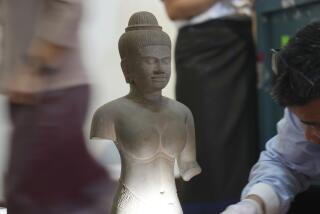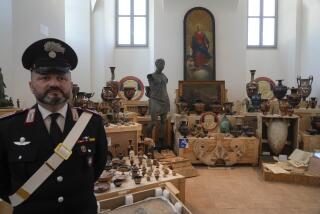An Italian offer U.S. museums shouldn’t refuse?
Rome — WITH a proposed settlement from New York’s Metropolitan Museum of Art in hand, Italian authorities are escalating their demands for the return of allegedly looted antiquities from other American museums.
The day after receiving the Met’s offer to return 20 disputed antiquities in exchange for loans, Italian Minister of Culture Rocco Buttiglione said that his government would pursue a combination of expanding investigations, the offer of negotiations and the threat of legal action in its pursuit of stolen artifacts. “I think this is the beginning of the process, not the end,” Buttiglione said in a wide-ranging interview last week during a tour of the ancient Etruscan city of Amelia. “We don’t want to take the path of litigation if it can be avoided. Of course, if it can’t, we may be compelled to do it.”
Buttiglione called the Met’s agreement to swap the contested antiquities for long-term loans “a model” for resolving the disputes with other museums, including the J. Paul Getty Museum, which houses more than 40 objects that Italian authorities claim were looted. Those objects are part of the ongoing criminal trial of the Getty’s former antiquities curator, Marion True, who is accused of conspiring to buy looted art.
In October, The Times reported that Italian prosecutors had tracked dozens more allegedly looted objects to several other U.S. museums, including the Boston Museum of Fine Art, the Cleveland Museum and the Princeton Museum. None of those museums has contacted Italian authorities, officials here said.
“Our offer is so friendly and so reasonable that it would be very unwise for any American museums to refuse to cooperate with us,” he said. “We can transform illegally acquired objects into loans.”
As Italian Ministry of Culture officials secured the Met’s offer, they were holding what they called “frank and productive” meetings with Getty officials.
At the same time, Italian prosecutors were meeting with Greek officials to discuss combining efforts in their antiquities trafficking inquiries.
Greece announced in November that it too would press a legal case against the Getty over four artifacts allegedly looted from that country. At the meeting, Italian officials shared evidence and offered training for Greek police. The Carabinieri, Italy’s paramilitary police, are widely believed to be the world’s leading specialists in tracking stolen cultural property.
“We are in the same water, and have to face the same problems,” said Italian prosecutor Paolo Ferri. The collaboration between Italy and Greece could lead to challenges. The trade between their ancient cultures often makes it difficult now to determine whether an object came from Italy or Greece, and whether it was removed in ancient times or excavated in the modern era.
One of the objects described in the Italian indictment against the Getty’s former curator, a marble statue of a young woman, or kore, is also among the items being sought by Greek authorities.
The Greeks insist it is Hellenistic, while Italian authorities say they have evidence that it was excavated illegally in Southern Italy, once part of Magna Grecia, the ancient Greek empire. The prosecutors expected to come to an agreement on the origin of the piece in future meetings.
Both countries have also been cooperating with U.S. Immigration and Customs Enforcement, which tracks looted antiquities into the United States, where the biggest buyers live.
Italian authorities have shared information from their investigation with ICE officials in Los Angeles and New York, and further cooperation is expected, Italian authorities said. “We’re working closely with Italian authorities and have a number of ongoing investigations,” said Virginia Kice, spokeswoman for ICE in Los Angeles.
The Italians’ 10-year investigation of Italian antiquities dealer Giacomo Medici, dubbed Operation Pandora, has grown to include other prominent dealers in the global trade of Greek and Roman antiquities, records and interviews show.
Using photographs seized from Medici’s warehouse, Italian authorities began by tracking more than 100 objects to the Met, the Getty and six leading U.S. museums, as well as in private collections and museums in Asia and Europe.
But using the carefully organized records of one of those dealers, Italian investigators say they have identified hundreds more allegedly looted objects at U.S. museums. An additional 10,000 objects mentioned in the records have not yet been located.
The records, some of which were reviewed by The Times, document contact between the dealer and known Italian looters, who used agreed-upon code words to offer objects for sale. Italian authorities asked that the dealer’s name be withheld while their inquiry continues.
Other records detail correspondence between suspect dealers and several American museum curators and collectors.
In the coming year, Italian prosecutors expect to indict one or more of these dealers. In addition, authorities here are preparing to contact U.S. museums with requests for detailed information about a how they acquired a growing list of suspect objects in their collections.
Depending upon the response of those museums, Italian officials say they will negotiate returns or file criminal or civil charges in both U.S. and Italian courts, officials here said.
“Until now, we have dreamed, we have slept,” said Maurizio Fiorilli, a federal prosecutor representing the Ministry of Culture in the antiquities cases. “Now it is time to wake up.”
Italy has requested the return of artifacts from U.S. museums for decades but has often met museums’ stiff resistance with a lack of compelling evidence.
The Italian agreement with the Met marks a new era in those conversations, Buttiglione said.
The culture minister said his government’s effort at reclaiming stolen antiquities had been aided as much by a shift in public opinion, both in Italy and the United States, as it had by newly developed evidence.
“We now know that there is the broad support of American public opinion that has recognized that our demands are legitimate and grounded in international law, and in one sense, natural law, in ethics,” Buttiglione said. “Without the support of the American public and the European public, it would not be possible what we have done.”
At the same time, Italy has recognized the need for reform of its own policies.
One of the richest countries culturally, Italy has for years jealously guarded its treasures, Buttiglione said. But as they became more vocal in requesting the return of artifacts looted from Italian tombs and ruins, Italians also recognized the need to share antiquities in the government’s collection, he said.
Last year, Italy extended the length of time it allowed objects to be loaned to foreign museums to four years.
More to Read
Sign up for Essential California
The most important California stories and recommendations in your inbox every morning.
You may occasionally receive promotional content from the Los Angeles Times.










